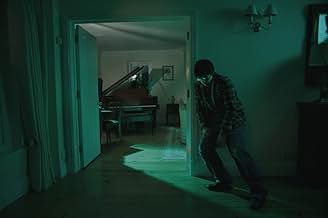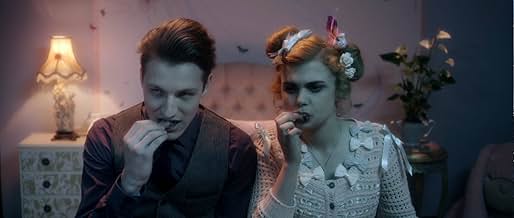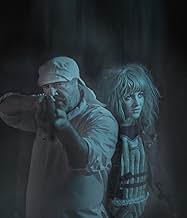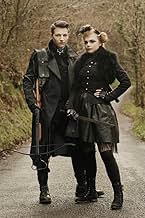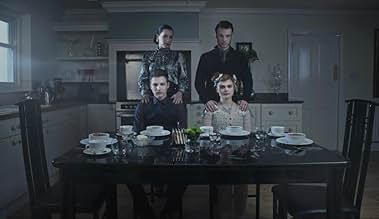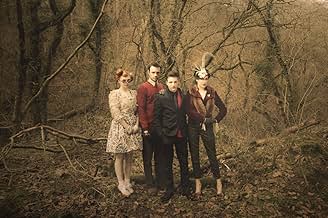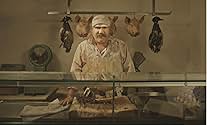IMDb रेटिंग
4.6/10
1 हज़ार
आपकी रेटिंग
अपनी भाषा में प्लॉट जोड़ेंAn aspiring teen detective stumbles into her first real case, when investigating the mysterious new family in her neighborhood.An aspiring teen detective stumbles into her first real case, when investigating the mysterious new family in her neighborhood.An aspiring teen detective stumbles into her first real case, when investigating the mysterious new family in her neighborhood.
- पुरस्कार
- कुल 1 जीत
Alastair G. Cumming
- Mr. Parker
- (as Alastair Cumming)
कहानी
क्या आपको पता है
- इसके अलावा अन्य वर्जनThe UK release was cut, the distributor chose to make reductions in two scenes of bloody violence in order to obtain a 15 classification (a frenzied stabbing with a knife and a man's head being shot). An uncut 18 classification was available.
- कनेक्शनReferences The Maltese Falcon (1941)
फीचर्ड रिव्यू
If you love films with literally no redeeming features, then Elfie Hopkins is for you. If, on the other hand, you are like me, and you enjoy written, well shot and well acted cinema then avoid like the plague.
The film focuses on angsty teenager Elfie Hopkins, played by sour faced 26 year old Jaime Winstone, who lives in a sleepy village in the depths of Wales with her father and step-mother. Her days seem to be entirely comprised of bickering with the step-mother and then smoking weed with Elijah Wood look-a-like Aneurin Barnard. When the village welcomes some new arrivals, the peculiarly named Gammons, Elfie's curiosity is piqued - are they all that they seem? What goes on behind the door's of this seemingly charming and cosmopolitan foursome? And why are the village's inhabitants steadily going missing?
The more relevant question is, why should we care? The answer, revealed over the course of what felt like 2 and a half torturous hours, but what was in fact just 89 minutes, is: we shouldn't.
The film opens with the eponymous Elfie driving her beat-up old car down a leafy Welsh Lane. We know she's cool because she's wearing John Lennon glasses and a knitted woollen hat. She finds a tree branch blocking the road, so gets out to move it; finding the car won't restart, she mutters an expletive under her breath and lights a cigarette. I've already forgotten that this is a woman at least 8 years older than the character she's supposed to be playing because everything about this scene is so real. The Gammons swoop by in their expensive looking 4x4 - they are sinister because their car and hair is black.
You know when adults try to write dialogue for teenagers and it feels like all those times that you and a friend were in the car with your dad and he kept using the word 'cool' and doing Ali G impressions? This is like an hour and a half of that. We are asked to believe that Winstone and Wood are the best of friends, bonded by their mutual love of weed and claustrophobic existence in this Welsh backwater, but at no point does their relationship seem convincing, and their conversations make the film feel like one long episode of skins. The chemistry is non- existent, and their scenes together only serve to enable to writers to introduce clunky plot- devices into the narrative ("Cripes Dylan, I can't believe I found this letter of acceptance to London University of London City in plain view on your desk and you weren't going to tell me about it?!").
There is only a token effort at characterisation: the step-mother is a cardboard cut-out of a succubus; Elfie is haunted by the demons of her past (including her dead mother); Elijah Wood is a nerd with glasses and curly hair; the Gammon man is a suave city-type who does yoga and wears lots of black; one of the Gammon children also likes black and shooting wildlife, while the other is kooky and dresses like a doll. None of these characters are likable because none of them are fleshed out beyond two-dimensions. They exist only to be a part of badly written dialogue and a poorly conceived narrative.
What I particularly enjoyed was the way that stuff was routinely shoe- horned into the film in the most hideously awkward way. Example: When a party guest of the Gammons is seemingly haunted by disembodied voices on his walk home and comes dashing back down the road screaming, Elfie, apropos of LITERALLY NOTHING, decides she needs to begin one of her investigations into the Gammons. Oh right, yeah, Elfie's an amateur detective: apparently everyone except the audience already knew this. When the 'investigation' fails to turn up any meaningful leads, the Elijah Wood character just announces that he has hacked into the computer systems of police stations in villages where the Gammons have lived. Of course we should have realised that he had that capability; he has glasses and curly hair, and a Packard Bell PC from the mid 90s, so it's on us to make those kind of assumptions.
Ray Winstone also makes a cameo appearance as a butcher who can't decide whether he is from East London, the West country or North Yorkshire, and ends up sounding like a cross between Ronnie Kray and one of the Wurzels. Try as Ray might however, there's simply no saving this train- wreck.
The film is at least shot in a beautiful part of the world, and autumnal colours prevail throughout, but personally I think the opportunity to use those colours to make the film more stylised and ethereal was completely missed. An other-worldly quality would have enhanced the film no-end, and made the unoriginal and tiresome twist, (which is thrust into the story with all the subtlety and finesse of Ray Winstone in stiletto heels) entirely more appropriate. Moreover making a remote Welsh village seem oppressively small is surely like shooting fish in a barrel, but at no point in the film is that sense of claustrophobia adequately conveyed. Finally the final scenes are gory and unpleasant, and are accompanied by incredibly jarring and inappropriate violin chords.
Basically this film doesn't know what it wants to be; it's not a teen comedy, or teen horror nor is it a twee indie flick; in the end the makers seem to have settled on that genre affectionately known as 'straight to DVD'.
The film focuses on angsty teenager Elfie Hopkins, played by sour faced 26 year old Jaime Winstone, who lives in a sleepy village in the depths of Wales with her father and step-mother. Her days seem to be entirely comprised of bickering with the step-mother and then smoking weed with Elijah Wood look-a-like Aneurin Barnard. When the village welcomes some new arrivals, the peculiarly named Gammons, Elfie's curiosity is piqued - are they all that they seem? What goes on behind the door's of this seemingly charming and cosmopolitan foursome? And why are the village's inhabitants steadily going missing?
The more relevant question is, why should we care? The answer, revealed over the course of what felt like 2 and a half torturous hours, but what was in fact just 89 minutes, is: we shouldn't.
The film opens with the eponymous Elfie driving her beat-up old car down a leafy Welsh Lane. We know she's cool because she's wearing John Lennon glasses and a knitted woollen hat. She finds a tree branch blocking the road, so gets out to move it; finding the car won't restart, she mutters an expletive under her breath and lights a cigarette. I've already forgotten that this is a woman at least 8 years older than the character she's supposed to be playing because everything about this scene is so real. The Gammons swoop by in their expensive looking 4x4 - they are sinister because their car and hair is black.
You know when adults try to write dialogue for teenagers and it feels like all those times that you and a friend were in the car with your dad and he kept using the word 'cool' and doing Ali G impressions? This is like an hour and a half of that. We are asked to believe that Winstone and Wood are the best of friends, bonded by their mutual love of weed and claustrophobic existence in this Welsh backwater, but at no point does their relationship seem convincing, and their conversations make the film feel like one long episode of skins. The chemistry is non- existent, and their scenes together only serve to enable to writers to introduce clunky plot- devices into the narrative ("Cripes Dylan, I can't believe I found this letter of acceptance to London University of London City in plain view on your desk and you weren't going to tell me about it?!").
There is only a token effort at characterisation: the step-mother is a cardboard cut-out of a succubus; Elfie is haunted by the demons of her past (including her dead mother); Elijah Wood is a nerd with glasses and curly hair; the Gammon man is a suave city-type who does yoga and wears lots of black; one of the Gammon children also likes black and shooting wildlife, while the other is kooky and dresses like a doll. None of these characters are likable because none of them are fleshed out beyond two-dimensions. They exist only to be a part of badly written dialogue and a poorly conceived narrative.
What I particularly enjoyed was the way that stuff was routinely shoe- horned into the film in the most hideously awkward way. Example: When a party guest of the Gammons is seemingly haunted by disembodied voices on his walk home and comes dashing back down the road screaming, Elfie, apropos of LITERALLY NOTHING, decides she needs to begin one of her investigations into the Gammons. Oh right, yeah, Elfie's an amateur detective: apparently everyone except the audience already knew this. When the 'investigation' fails to turn up any meaningful leads, the Elijah Wood character just announces that he has hacked into the computer systems of police stations in villages where the Gammons have lived. Of course we should have realised that he had that capability; he has glasses and curly hair, and a Packard Bell PC from the mid 90s, so it's on us to make those kind of assumptions.
Ray Winstone also makes a cameo appearance as a butcher who can't decide whether he is from East London, the West country or North Yorkshire, and ends up sounding like a cross between Ronnie Kray and one of the Wurzels. Try as Ray might however, there's simply no saving this train- wreck.
The film is at least shot in a beautiful part of the world, and autumnal colours prevail throughout, but personally I think the opportunity to use those colours to make the film more stylised and ethereal was completely missed. An other-worldly quality would have enhanced the film no-end, and made the unoriginal and tiresome twist, (which is thrust into the story with all the subtlety and finesse of Ray Winstone in stiletto heels) entirely more appropriate. Moreover making a remote Welsh village seem oppressively small is surely like shooting fish in a barrel, but at no point in the film is that sense of claustrophobia adequately conveyed. Finally the final scenes are gory and unpleasant, and are accompanied by incredibly jarring and inappropriate violin chords.
Basically this film doesn't know what it wants to be; it's not a teen comedy, or teen horror nor is it a twee indie flick; in the end the makers seem to have settled on that genre affectionately known as 'straight to DVD'.
टॉप पसंद
रेटिंग देने के लिए साइन-इन करें और वैयक्तिकृत सुझावों के लिए वॉचलिस्ट करें
विवरण
- रिलीज़ की तारीख़
- कंट्री ऑफ़ ओरिजिन
- आधिकारिक साइटें
- भाषा
- इस रूप में भी जाना जाता है
- Elfie Hopkins: Cannibal Hunter
- फ़िल्माने की जगहें
- उत्पादन कंपनियां
- IMDbPro पर और कंपनी क्रेडिट देखें
बॉक्स ऑफ़िस
- दुनिया भर में सकल
- $10,726
इस पेज में योगदान दें
किसी बदलाव का सुझाव दें या अनुपलब्ध कॉन्टेंट जोड़ें




